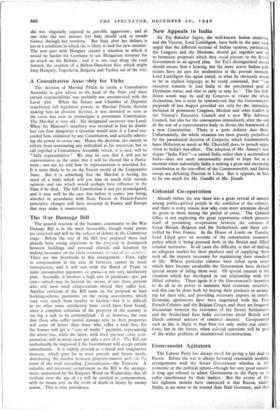The War Damage Bill
The general reaction of the business community to the War Damage Bill is in the main favourable, though many points are criticised and will be the subject of debate in the Committee stage. Before the text of the Bill was prepared there had already been strong objections to the proposal to distinguish between buildings and personal chattels and furniture by making insurance on the latter voluntary instead of co.npalsory. There are two drawbacks to this arrangement. First, right to compensation in the case of furniture cannot be made retrospective, and it will rest with the Board of Trade to make retrospective payments ex gratia—a not very satisfactory plan. Secondly, it involves a high rate of premium-3os. per cent.—which may be beyond the means of just those persons who will most need compensation should they suffer loss. Another criticism of the Bill turns on the proposal to base building-scheme premiums on the rating assessments, which vary very much from locality to locality—but it is difficult to see what more • satisfactory basis could have been found, since a complete valuation of the property of the country is too big a task to he contemplated. It is, however, the case that those who suffer partial damage only to their properties will come off better than those who suffer a total loss, for the former will get a " cost of works " payment, representing the whole loss, while the latter, with their pre-war value com- pensation, will in many cases get only a part of it. The Bill can undoubtedly be improved if the Government will accept certain amendments. It is rightly greeted as a broad and imaginative measure, which goes far to meet present and future needs, distributing the burden between property-owners and—in the event of the total exceeding £200,000,000—the Treasury. A valuable and necessary complement to the Bill is the arrange- ment, announced by Sir Kingsley Wood on Wednesday, that all civilians over the age of 15 will be entitled to compensation, with no means test, in the event of death or injury by enemy action. This is wise providence.


























 Previous page
Previous page